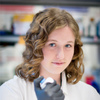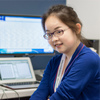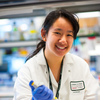

For six College of Science students, summer “break” meant advancing their research skills at MD Anderson Cancer Center in Houston, Texas. The students’ experiences were funded by Notre Dame through the generosity of a donor.
The University of Notre Dame Summer Undergraduate Research Program at MD Anderson Cancer Center, is a competitive, ten-week program designed for outstanding and highly motivated Notre Dame undergraduate students interested in pursuing a career in cancer research. Dominic Chaloner, the undergraduate research co-ordinator, explained that the selected students have the opportunity to participate in “cutting-edge research” at what is known as “one of the top centers for cancer research in the country, if not the world.” The program offers undergraduate students the opportunity to gain hands-on experience that simply cannot be replicated in a classroom or teaching lab. Following, four seniors and two juniors share what they learned from their experiences.
 Kathryn Tighe
Kathryn Tighe
Kathryn Tighe, a junior neuroscience and behavior major, worked on research to investigate the timing of mitochondrial DNA replication relative to the cell cycle. About her experience she shared, “I thought I knew what to expect having taken several biology lab courses, but now I know that nothing quite compares to the real thing. I have learned so many new techniques this summer and have improved the skills I learned at school. . . While my mentors were very hands-on and willing to explain their rationale and procedures, they also gave me considerable independence which has been invaluable for not only widening my skill set, but also bolstering my self-confidence.”
 Maggie Li
Maggie Li
Maggie (Zhenyue) Li, a senior biochemistry and applied math dual major, worked on the computational analysis of glioma, or brain tumors. About her experience she said, “I even went inside an operating room for the first time and experienced what is involved in being a surgeon. Being able to visualize the many ways that I can help people as a doctor felt really amazing. [I have] grown so much as a researcher and become more determined to become a doctor.”
 Amy Wang
Amy Wang
Amy Wang, a senior preprofessional studies major, conducted research to identify the biological consequences of chronic stress in colon epithelium. Wang said her mentor, Dr. Dorniak, “provided guidance with performing the different techniques needed for my research, but he also allowed me the independence to perform the techniques on my own. The experience has given me greater confidence in my skills as a researcher and reassured me of my interests in the clinical field as it applies to medicine.”
Dan McKee, a senior science-business major, researched the protein expression patterns in triple-negative breast cancer tissues. McKee said, “The goal of these analyses is to detect molecular differences between the tumor before treatment and the residual tumor after [treatment with chemotherapy]. The differences that are found can help highlight potential reasons for the survival of some cells after chemotherapy.” McKee said of his experience, “Being able to comprehend a problem and logically work through a set of steps to create a solution is imperative to succeeding in research and medicine. My immersion into research this summer taught me more about how to find solutions and stay determined when you appear to have reached a dead end.”
Brad Martin, a junior neuroscience and behavior major, worked in a lab that primarily studies the role of the tumor microenvironment in the early metastasis of lung cancers. “I have been extremely lucky to have a great research mentor. . . Even with the techniques that I have had previous experience with, she has helped me understand them to much greater level. I now know and understand the reasons behind specific methods but also how scientists think about their research and experiments. . . I know I am learning from some of the best cancer researchers in the world,” Martin commented about his experience.
Matthew Goblirsch, a senior chemistry and philosophy major, studied microRNAs in cancer and sepsis. Goblirsch shared about his experience, “As someone who never had much time during the semester for research, these two summers have been very important for me in developing my understanding of and appreciation for life in a laboratory. . . There were challenges, but we dealt with the issues as they came up. In fact, I now appreciate the challenges much more than the successes, because I gained more skills in working through the difficulties than I ever could gain if things always went well and according to plan.”
Originally published by Tammi Freehling at science.nd.edu on September 02, 2016.